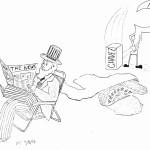
An aneurysm does not have to be a life-threatening condition today. Once diagnosed, it can be monitored and controlled. If it poses risk to the patient, doctors can perform a simple medical procedure and prevent the aneurysm from bursting.
Even though his aneurysm had been diagnosed months before, earlier this year, my great uncle had my grandmother hold his hand as she saw his heart rate trickle down until he passed in front of her eyes. Hospitals, which until recently were performing the routine procedure that would have saved him, turned him away, because they did not have the necessary supplies to perform it.
Say hello to Venezuela. This South American country, half the size of Texas, is home to 30.41 million people, has the longest Caribbean coastline on Earth and is the potential site of the next human tragedy. But how did it come to this? Ordinary citizens lack access to basic medical care and services. And how could a great deal more attention not be directed at this actively collapsing state?
In 2012, the World Economic Forum ranked Venezuela dead last in judicial independence. Freedom House’s press freedom ranking calls the country’s press “not free,” with only a handful of countries ranking worse, such as Sudan, Russia, North Korea and China. Crime statistics are censored by the government, but independent observers measured the yearly homicide rate to be 90 per 100,000 inhabitants, placing it first globally next to Honduras. In the past 15 years, 270,000 people have been murdered in the country’s streets, with 10 percent of those homicides occurring last year. In my hometown of Caracas, two people are killed every hour.
Even though Venezuela is less than 3,000 miles away from the United States’ southern border, it seems media coverage about the ongoing crises in Venezuela extend only to 30-second highlights once a week on CNN, Fox News or MSNBC. Yet, despite such a lack of attention, dissecting where the country’s problems come from is actually simple: Just look at the governance.
The oil-rich country was never highly developed, but since the Hugo Chávez regime took power in 1999, the poverty rate rose to 76 percent, and the minimum wage stands at an unsustainable $65 per month, of which $22.5 are in cash and the rest are in food stamps. Chronic food shortages abound and medicine scarcity is severe. The Venezuelan people, sick and starving, have taken to rioting and looting to protest the situation.
Attempts to unseat the government by an opposition coalition have been unsuccessful. Last December, Venezuelans elected opposition representatives to the National Assembly, the legislative body, by an unprecedented majority, but every action the body has attempted has been annulled by the government-controlled Supreme Tribunal of Justice.
Last week, 1 million people dressed in white and carrying Venezuelan flags took to the streets peacefully to demand a recall vote to oust President Nicolas Maduro, and millions have signed an official petition for the government to activate a recall process. Yet the existing government, in collusion with the Election Commission, continues to enact electionrigging policies to prevent any change, including having public employees work just two days a week. With a constitutionally specified maximum number of business days to hold the recall vote, the phrase “20 business days” now means five months instead of just one. Not only are corrupt officials delaying the vote, but if the president is recalled next year instead of this one, his vice president, according to constitutional law, takes charge, and the existing regime continues.
And things will not get better soon. The value of the bolivar currency continues to plummet; food and medicine are becoming more scarce and expensive; the country is still the 10th most corrupt on the planet. Uncertainty is endemic: People fear how the government might react to further protests, patients wonder about getting treatment and families do not know when they will eat next.
Geographically speaking, Venezuela is closer to Washington, D.C., than San Francisco is. An immense tragedy is happening in our backyard. If the Venezuelan people do not receive our support, they at the very least deserve our attention. Stay tuned.
Ricardo Mondolfi is a sophomore in the School of Foreign Service.














Ricardo M • Sep 13, 2016 at 10:58 pm
Please share the article! Awareness is the most important contribution you can make.
Also, here’s a video of the Venezuelan president being chased by angry citizens. https://www.nytimes.com/2016/09/04/world/americas/venezuelan-president-is-chased-by-angry-protesters.html?_r=0